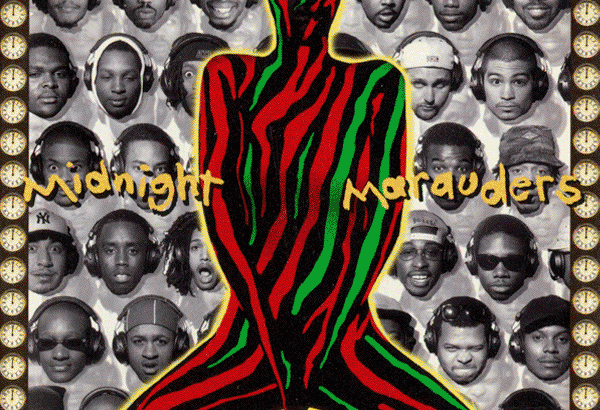Dedicated to Phife Dawg, rest in peace.
9th November 1993 was a huge day for hip-hop, with two of the most important albums in its history out at the same time. The first was east coast classic Enter The 36 Chambers by The Wu-Tang Clan. The second was Midnight Marauders by A Tribe Called Quest going on to release their highly anticipated third album. Music groups are lucky enough if they have one album considered a ‘classic’. Along with The Low End Theory and last year’s We Got It From here… Thank You 4 Your Service, Tribe have three.
Personally, my introduction to Tribe in general was fairly recent. While I’d love to say someone handed me a cassette, or the radio spun one of their hits, I was simply linked to a few of their big songs when I was younger. Tracks like Can I Kick It?, Check The Rhime, Award Tour, played a huge role in my high school years, yet funnily enough I was in love with the singles before even thinking of checking out the albums they resided in. It took some time for me to get my hands on the album after that, but boy was I in for a treat.
Midnight Marauders showcases the signature jazz-rap style they had pioneered on their first two albums. Everything is taken to the unthinkably higher level. Q-Tip’s beats are just that much more intricate, skilfully composed with increasing finesse. Together, the pair are lyrically sharper than ever. Where The Low End Theory was where we really heard Phife Dawg shine, Midnight Marauders saw Q-Tip meet him at the fore.
The solo Phife track 8 Million Stories is a great example of this, where he describes his everyday problems and relates that back to you, the listener, with unique and witty insight. His flow is backed by crafty metaphors, wordplay, references and a deep boom-bap bassy beat, making for one of the album’s biggest standouts.
Tip’s solo piece, Sucka N***a is another album highlight. The beat teases you, a mixture of vocal and horn stabs which give way to a subtle piano groove and crushing drums – and that’s before we talk about the lyrics, which are among Tribe’s most insightful, ever, studying the rising use of the controversial word. He looks at it’s past and how it’s become a term of endearment among black communities; it’s a fan favourite for sure, along with being an important analytical slice of hip-hop history.
While their solo output is incredible – furthered on their post-A Tribe Called Quest releases – it’s their work together that really turns heads and sets them apart from the rest. Electric Relaxation, arguably one of the most romantic songs in hip-hop history, is one of the best examples on the album, as Phife and Q-Tip’s tangling verses demand your attention. Thumping drums, a slapping bassline, contrasted by a timeless heartfelt key and guitar chord sample, the pair spit some pretty provocative lines in an attempt to seduce their lady. An extra fun fact, the beat to the tune plays out as a three bar loop, rather than the traditional 4/4 style, something which was rarely seen and is rarely attempted in hip-hop to this day.
The continuity and cohesiveness of the album is well worth a mention too. Upon first needle drop, we are immediately greeted by our the album’s ‘tour guide’, the mysterious woman on the cover who contextualises certain tracks throughout. She leads the listener from one track to the next, and just as a guide would, provides random facts that lead you onto the next destination. It truly feels like a serious work of art, so ahead of it’s time that it’s hard to imagine what hip-hop would be like without it today.
Award Tour was the single which first introduced me to Midnight Marauders; like so many others, it was an instant favourite – it’s unsurprising that this track charted higher than any other on the record. Their augmented flows are reminiscent of jazzy scat singing, while their voices themselves, each so different to one another, are instruments themselves. “Lyrically I’m Mario Andretti on the MOMO, ludicrously speedy, or infectious with the slow-mo,” is one of the best lines on the record. Combine this with an upbeat pianos and xylophones, and a hook courtesy of De La Soul‘s Dave, it’s a certified classic anthem.
No track is too complicated, no track is so overwhelming that the lyrics or music trump the other; it’s a perfect balance throughout. In many ways, there’s a simplicity to it that brings it together and makes it work so well. Oh My God embodies this brilliantly, crafted around head churning double bass plucks and a ferocious trumpet chorus which chops in and out of the mix. Similarly, Clap Your Hands is driven by smooth piano chords throughout the verses, never suffering from repetition thanks to constantly interchanging trumpets, scratches, and other samples.
From the rock influenced guitar stabs which shrill throughout Lyrics To Go, to the psychedelic, atmospheric samples of Midnight, the beats and musical influences were more diverse than anything coming out at the time.
A Tribe Called Quest are one of the most important groups in hip-hop history, and this album directly influenced hip-hop in immeasurable ways. Every beat, every rhyme scheme, everything down to the cover art (which features over 71 influential hip-hop figures) is meticulously thought out, and cements it as a major player in hip-hop’s hall of fame. A timeless, stunning, monumental record that even those who don’t like hip-hop should listen to at least once in their lives.
Image: Ego Trip

